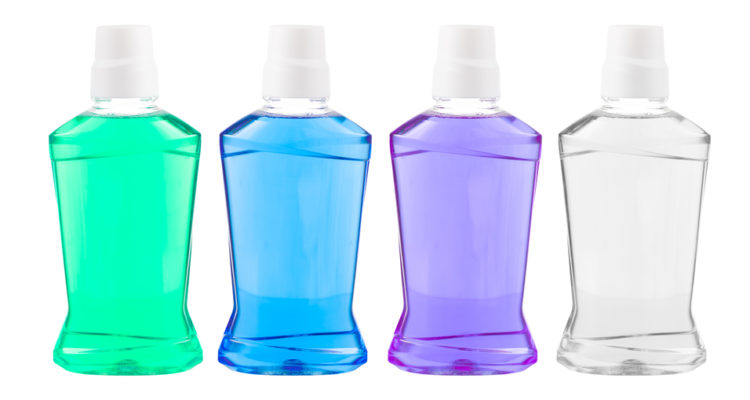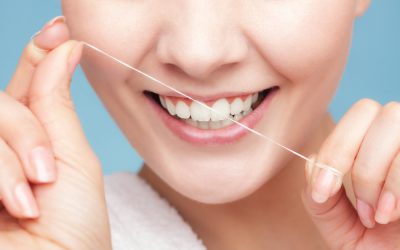The mouthwash aisle at any local convenience store displays a kaleidoscope array of bright green, blue, and pink rinses from which to choose. With so many options at your disposal, how do you know which one will provide the most benefit towards the health of your mouth and teeth? And are mouthwashes really worth all the hype at all?
While mouthwash should never replace daily brushing and flossing, it can be a good supplementary measure to catch any lingering bacteria the toothbrush missed. Here’s what you need to know about choosing the best rinse for your oral health needs:
Basic Types of Mouthwash
- Cosmetic products: Cosmetic mouthwashes are designed to reduce halitosis and leave your mouth smelling fresh. These rinses temporarily kill bacteria that cause bad breath, but outside of eliminating odor they have no effect on your oral health – cosmetic products will not protect against plaque build-up, gingivitis, or cavities.
- Fluoride rinses: These mouthwashes contain the active ingredient fluoride, which strengthens tooth enamel and helps prevent tooth decay. Using a strictly fluoridated mouthwash may not be necessary if you already use fluoride toothpaste and/or drink tap water with fluoride in it. However, a fluoride rinse may be the best choice if you are prone to developing cavities or have a medical condition such as dry mouth that affects the bacterial balance in the mouth and speeds up tooth decay.
- Antibacterial mouthwashes: Antibacterial rinses are effective when used in conjunction with regular brushing and flossing as part of a good oral health care routine. These mouthwashes provide an extra boost of gum, teeth, and mouth health by killing bacteria you may miss with the toothbrush or floss. As an added bonus, many antibacterial washes contain the active ingredient fluoride, which further strengthens teeth against harmful bacteria. When purchasing an antibacterial mouthwash, look for the ADA seal of approval – this ensures the rinse is an effective anti-gingivitis and anti-plaque product.
Other Oral Health Considerations
For most people, a daily ADA-approved antibacterial rinse used alongside brushing and flossing is sufficient to maintain a healthy mouth. But if you suffer from mouth ulcerations, dry mouth, gingivitis, frequent cavities, or other oral problems, talk to your dentist about finding a mouthwash that meets your specific oral health needs. He or she may even order a stronger prescription mouthwash to treat severe oral health issues.
- Antiseptic mouthwashes: Antiseptic rinses may be prescribed to treat oral ulcerations, fight severe gingivitis or periodontitis, or following mouth surgery or suture placement, when using a toothbrush properly is challenging. Antiseptic mouthwashes are the gold standard of oral rinses, due to their ability to target and kill mouth bacteria, spores, and fungi. Most antiseptic washes are prescribed for short-term use and are generally not necessary for continued long-term oral cleanliness.
- Alcohol-free mouthwashes: If you suffer from dry mouth or sensitive teeth, use an alcohol-free rinse to lessen mouth irritations. Alcohol is a dehydrator and can exacerbate an existing dry mouth condition. If your child is ready to use mouthwash, choose an alcohol-free solution for young kids, because they are more likely to swallow the rinse.
- Teeth-whitening mouthwashes: Some over-the-counter rinses contain a whitening agent such as hydrogen peroxide that promises to help reduce the appearance of surface stains caused by foods, wine, coffee, smoking, and age. There is not adequate scientific research to conclude that whitening washes are effective, and furthermore use of rinses with peroxides may irritate the gums and increase tooth sensitivity. If you are interested in whitening your teeth, speak with your dentist first to find the safest treatment for your needs.
- Lubricating mouthwashes: Dry mouth is a condition in which the mouth cannot produce enough saliva – it can develop due to smoking, certain medications, or dehydration, and it can become a chronic issue that leads to difficulties speaking, chewing, and swallowing. If you suffer from dry mouth, consider purchasing an alcohol-free mouthwash made with lubricating agents specifically designed to increase moisture and soothe the feeling of dry mouth.
Any mouthwash is meant to enhance your regular oral routine: there is no substitute for brushing your teeth for two minutes twice a day and flossing once daily before bedtime. If you include a daily dose of mouthwash, read the product label and follow the recommended time for swishing the rinse around your mouth. If you have any questions about use, schedule an appointment with Boyett Family Dentistry, where our own Dr. Boyett will be happy to help you determine which type of mouthwash will benefit you most. Call us today at 863-294-9200.






